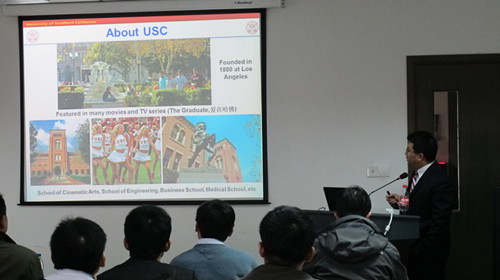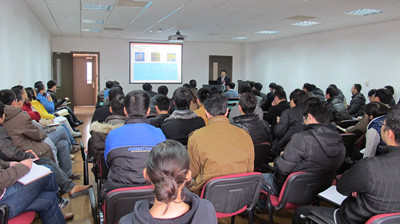On December 9th, 2013, Prof. Chongwu Zhou from Department of Electrical Engineering, University of Southern California(USC), the United States(U.S.), was invited to visit Suzhou Institute of Nano-Tech &Nano-bionics, Chinese Academy of Sciences (SINANO) and gave a talk entitled “Carbon Nanotubes: Synthesis, Properties and Applications”. The presentation was chaired by Prof. Yuegang Zhang, the director of International Laboratory for Adaptive Bio-nanotechnology. Researchers and graduated students attended the lecture.
Prof. Zhou presented the synthesis of massively aligned single-walled carbon nanotubes atop sapphire and quartz substrates, and also presented their recent progress toward type-controlled and chirality-controlled carbon nanotube synthesis, such as nanotube cloning for single chirality nanotubes. In addition, he reported macroelectronics based on separated nanotube thin film transistors, including key technology components such as assembly of separated nanotube networks, high-yield fabrication of devices, and applications for AMOLED displays and printed electronics.
Biography:
Dr. Chongwu Zhou is a full professor of Department of Electrical Engineering at University of Southern California (USC). He previously held positions of Jack Munushian Associate Professor (2006 - 2011) and Assistant Professor (2000 - 2006) at USC. He received Bachelor’s Degree from the University of Science and Technology in 1993, received Ph.D. in Electrical Engineering from Yale University in 1999, and worked as a postdoc at Stanford University from 1998 to 2000. Dr. Zhou has authored 151 journal publications with 14,308 citations. His research interest covers nanomaterials, nanoelectronics, energy nanotechnology, and bionanotechnology. He is an Associate Editor for Nanotechnology and IEEE Transactions on Nanotechnology, and serves as an Editorial Advisory Board member for ACS Nano. He has received many awards, including the NSF CAREER Award (2002), the NASA TGIR Award (2002), the USC Junior Faculty Research Award (2004), and the first IEEE Nanotechnology Early Career Award (2007).



